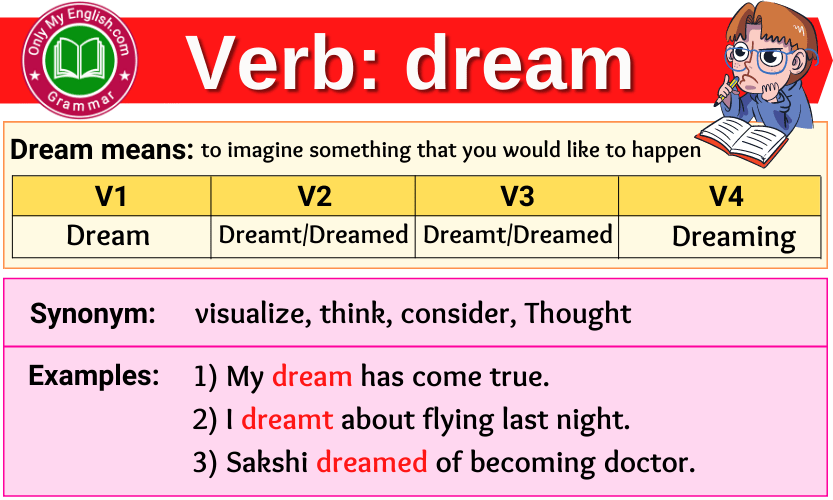
Dream Verb Forms Past Tense, Past Participle & V1V2V3
have dreamt (also dreamed) The present perfect tense is for an action that began in the past. (Often, the action continues into the present.) have been dreaming. have been dreaming. has been dreaming. have been dreaming. have been dreaming. have been dreaming.

Dream Past Tense, V1 V2 V3 V4 V5 Form Of Dream, Past Participle Of
The use of "dreamt" as the past tense or past participle is considered a spelling mistake by many. Brits Also Prefer "Dreamed" Outside America, "dreamed" is more common, but "dreamt" is generally accepted. In British English, "dreamed" is twice as common as "dreamt." [ evidence ] Verbs with Irregular and Regular Forms
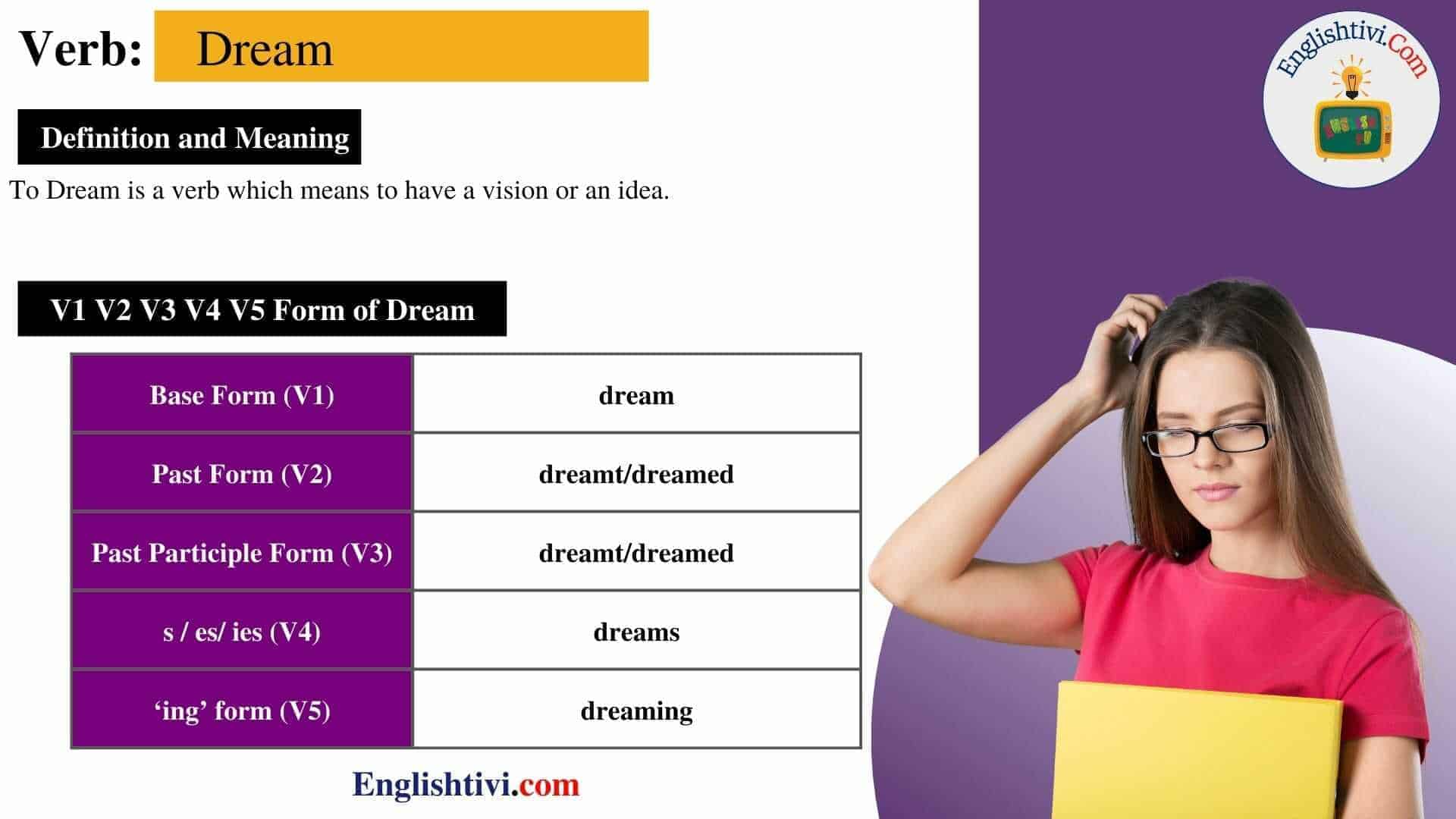
Dream V1 V2 V3 V4 V5 Base Form, Past Simple, Past Participle Form of
Simple Past Tense He/She/It dreamed or dreamt or drempt (dated). I dreamed or dreamt or drempt (dated). You/We/They dreamed or dreamt or drempt (dated). Past Continuous Tense He/She/It was dreaming. I was dreaming. You/We/They were dreaming. Past Perfect Tense He/She/It had dreamed or dreamt or drempt (dated).

Past Tense Of Dream Dreamed or Dreamt? (Pronunciation & Usage)
What Is the Past Tense of "Dream"? powered by LanguageTool Dreamed or dreamt—is there a difference? We'll go over this and more. Both "dreamed" and "dreamt" are acceptable past tense forms of "dream." Dreamed and dreamt are both the past tense and past participle of the verb dream.

Unit 1. Dream (Simple Past Tense) YouTube
They both mean to have been thinking of or imagining things as possible or happening when asleep or awake. Both are considered correct and function as the past tense and past participle of the verb dream. Dreamed is preferred in all main varieties of English, but dreamt is more likely to be used in British English than American English.

Conjugation Dream 🔸 Verb in all tenses and forms Conjugate in past
What is the difference between dreamed and dreamt?. Dreamed and dreamt are both past tense forms of the verb dream.The main difference between the two is that "dreamt" is the irregular past tense form, while "dreamed" is the regular past tense form. What are regular and irregular verbs? Regular verbs are verbs that follow predictable patterns for their past and present participle forms.

Past Tense of Dream, Past Participle of Dream, V1 V2 V3 V4 V5 Form of
Dreamt and dreamed are two different spellings of the past tense of the verb "dream," used to refer to the act of experiencing thoughts or images while asleep or to the act of fantasizing while awake. The spelling tends to vary based on whether you are using UK or US English: In UK English, both "dreamed" and "dreamt" are commonly used.

Dreamed or Dreamt—A Quick Guide
A past participle form of a verb can be used to form the present perfect verb tense ( have dreamed/dreamt) or the past perfect verb tense ( had dreamed/dreamt ). Here's an example of dreamed and dreamt being used in present perfect form: I dreamed/dreamt of this moment!
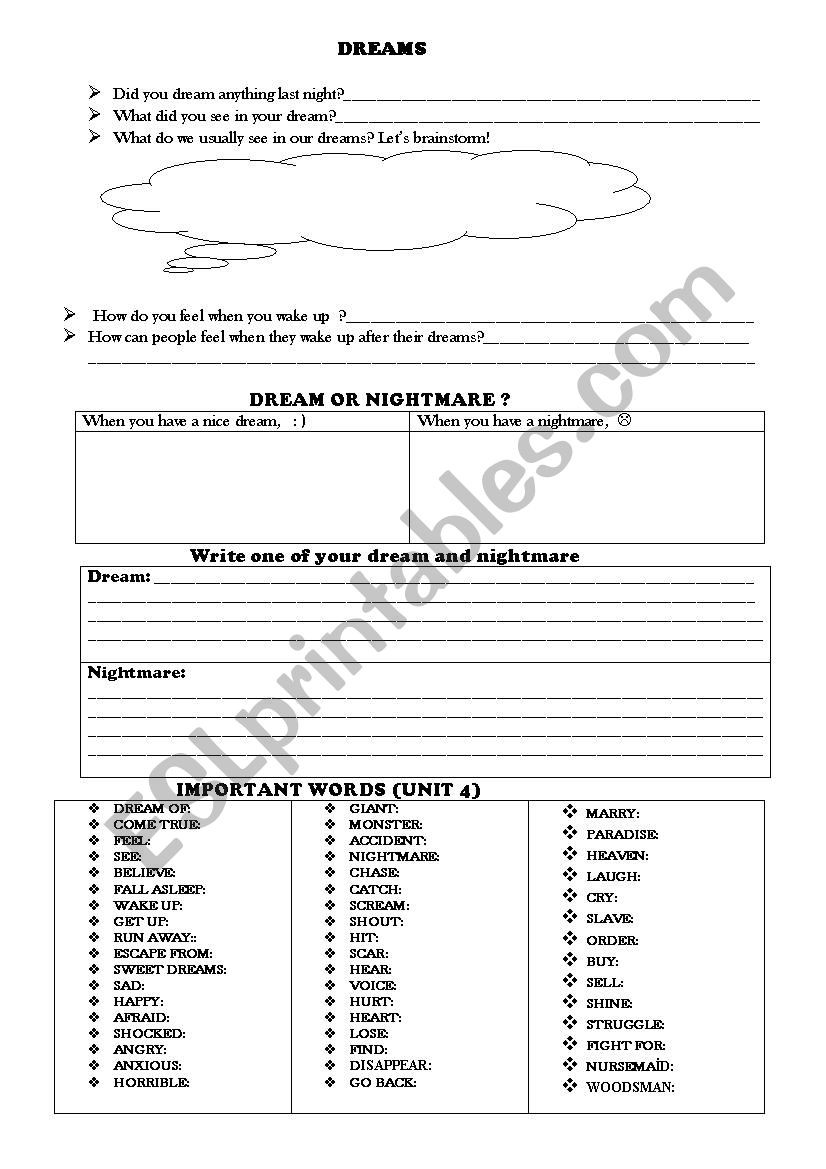
Dreams worksheet (simple past tense) ESL worksheet by cigdem62
What Is The Past Tense Of Dream? While many other verbs only have one past tense form, the past tense for dream accepts two correct forms: dreamed and dreamt. Although both are accurate, dreamt is more frequently used in British and American English. Compared to Americans, the British frequently use dreamt, albeit not as frequently as dreamed.
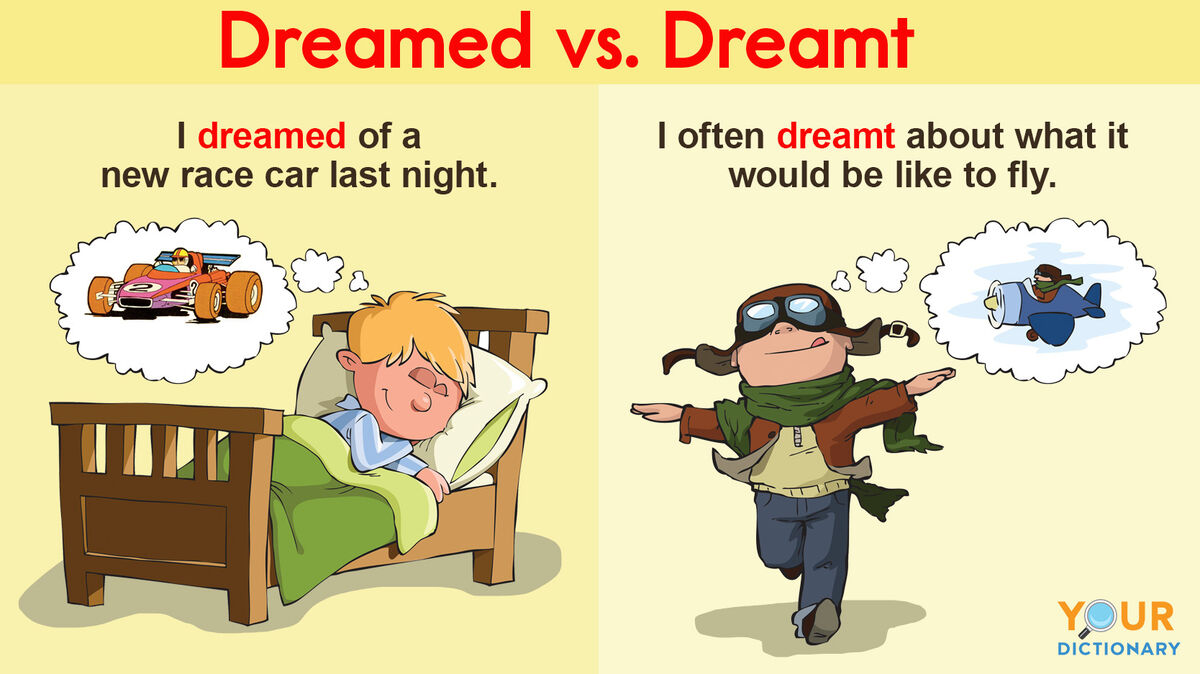
Dreamed or Dreamt What’s the Difference? 2024 AtOnce
Answer The past tense of dream is dreamed US or dreamt UK . The third-person singular simple present indicative form of dream is dreams . The present participle of dream is dreaming . The past participle of dream is dreamed US or dreamt UK . Find more words! dream Similar Words thought imagined pictured envisaged envisioned conceived dreamt UK

What's the Past Tense of Dream? (Dreamed or Dreamt?)
Dreamt and dreamed are both past tense forms of dream. Dreamt is more common in Britain, while dreamed is more common in other English-speaking countries, including the U.S. Dreamed seems to be more popular than dreamt when talking about sleeping, but when dream has a hopeful, literary sense, dreamt might be used.

What is The Past Tense of DreamMaking English Fun
Verb Table for dream Continuous tenses Imperative Impersonal Simple tenses Present Past Present Perfect Past Perfect Will -Future Going to -Future Future Perfect Return to the dictionary Top of page Found an error? We appreciate your feedback. Click here! Continuous tenses Present Past Present Perfect Past Perfect Will -Future Going to -Future
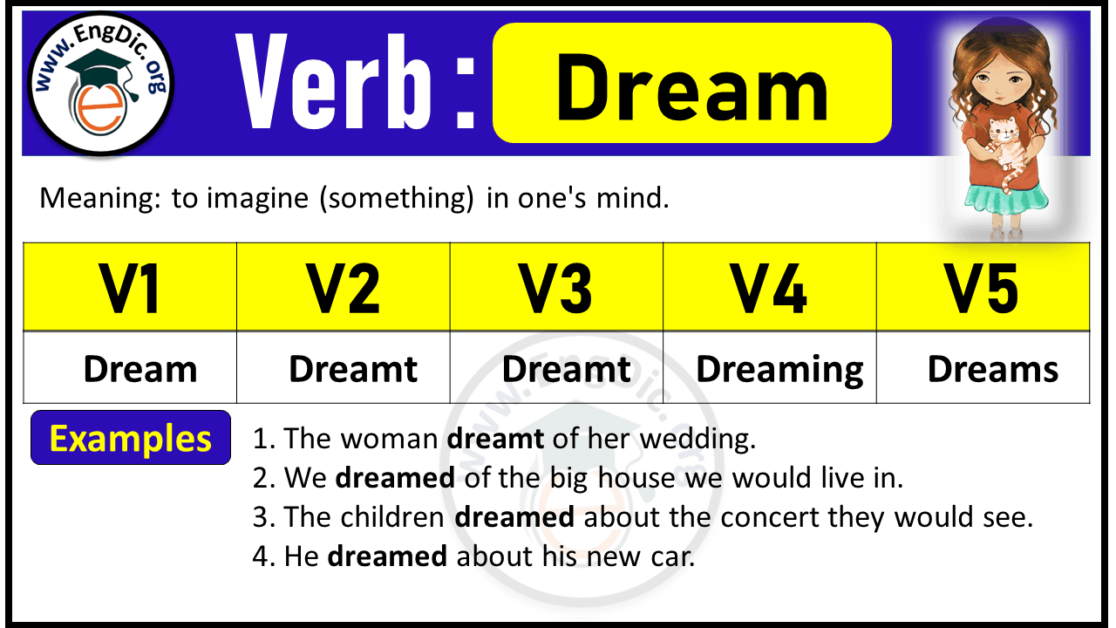
Dream past participle Archives EngDic
It is simply a past tense and past participle of ' dream ', also known as the British version. You can consider this term to be an irregular verb, as it has a (-t) instead of a (-d) or (-ed). Certain writers might consider 'dreamt' to have a unique flair to it as it has an unconventional spelling & ending. They might use this term to.
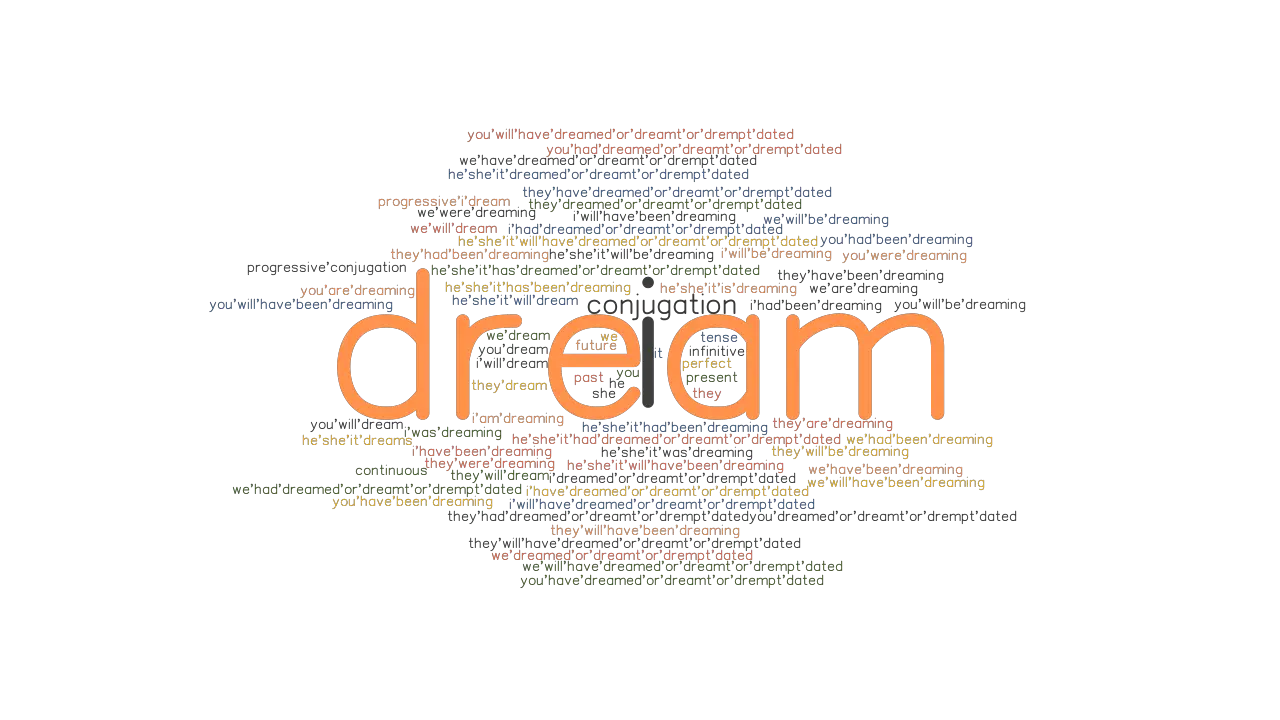
Dream Past Tense Verb Forms, Conjugate DREAM
What is the past tense of "dream?" Most commonly, the past tense of the word "dream" is "dreamt." Although the word form will change based on its participle. And the sentence where it's used. For example, referencing "dream" in the present participle form will change it to "dreaming," but in the infinitive form, will be "dream."

Dream Past Tense, Past Participle, Verb Forms V1 V2 V3 V4 V5
Dreamed is the past tense, and past participle, of the verb dream, which means to imagine or to experience the thoughts and sensations of an active mind while asleep. To dream is also sometimes used figuratively as a synonym of the words design or create, as in the phrase to dream up. For example,

Dream V1 V2 V3 V4 V5 , Past Tense, Past Participle Form of Dream
The correct plural of the verb "to dream" is actually "dreamed" in most contexts, particularly American English; however, in British English and in the Queen's English, it is also "dreamt," similarly to "spelt" for "spelled.". This is one of the words that actually does follow the rules for the past tense. Adding "-ed.